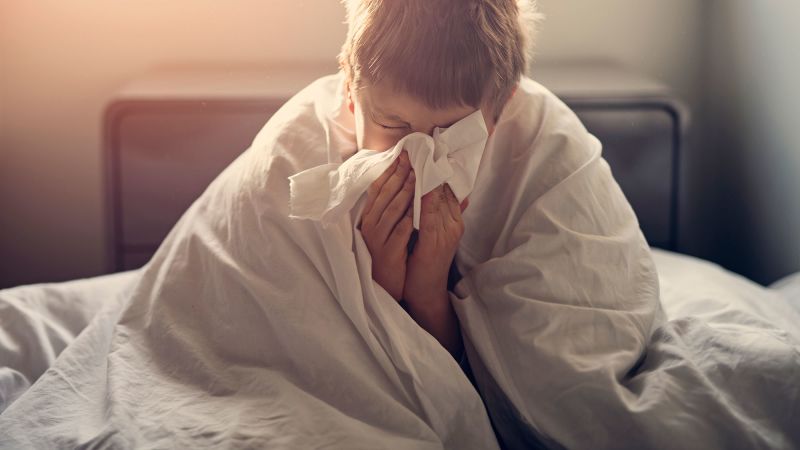Children who have coughs that go on for weeks may have a type of walking pneumonia that’s been surging in the US this year, and they may need a different antibiotic regimen to treat it, infectious disease experts say.
“It’s very much been on our radar since early summer, when we started to see a remarkable increase in the number of kids with pneumonia who seemed to have this particular type of pneumonia,” said Dr. Buddy Creech, a pediatric infectious disease specialist at Vanderbilt University Medical Center.
Creech says that on the same day in August, four Nashville-area pediatricians reached out to him to ask why so many kids were coughing in the summertime. These doctors wanted advice, he says, because their go-to antibiotic for pneumonia – amoxicillin – didn’t seem to be working in these cases.
The pneumonia is caused by tiny Mycoplasma pneumoniae bacteria and cases are spiking this year, particularly among preschool-age children, according to the US Centers for Disease Control and Prevention, which sent a bulletin alerting parents and doctors to the uptick last week.
Mycoplasma pneumonia is the latest entry on a growing list of lung infections keeping doctors on their toes this fall. Whooping cough, or pertussis, cases – which also cause a prolonged cough – are five times higher than they were at this time last year, and respiratory syncytial virus, or RSV, is also rising in parts of the US.
In the past, it’s been difficult to test for Mycoplasma. It’s not a germ that likes to grow in a Petri dish, which is the standard, if slow, way to test for bacterial infections.
Now, Creech says, better diagnostic tests are making it easier to detect these bacteria more quickly and reliably. With so many germs making kids cough this fall, it’s crucial that doctors use these new tests to get the right diagnosis, he said.
“This is the exact time where we need to be using these diagnostic tests that can guide treatment,” he said.
Awareness of the Mycoplasma trend is important, the CDC says, since first-line antibiotics for kids such as amoxicillin and penicillin don’t kill this type of bacteria. The infection is usually easily treated with other antibiotics, however, such as azithromycin.
According to the CDC, which monitors discharge data from a network of hospitals as well as test results from commercial laboratories, the number of children ages 2 through 4 who were seen in the ER for pneumonia and who tested positive for Mycoplasma increased from 1% in April 2024 to 7.2% in early October, a 700% increase. Diagnoses in older kids doubled over the same time frame, increasing from 3.6% to 7.4%.
The CDC said Mycoplasma cases seem to have peaked in mid-August, but they remain high. Creech said he expects they will continue to be high for another month or so, then should begin to taper off later into the fall.
On an X-ray, Mycoplasma infections can give lungs a cloudy or “white lung” appearance.
Last year, China, Denmark and France all reported increases of this kind of pneumonia in kids.
The rise in cases is probably due to at least three factors, said Dr. Geoffrey Weinberg, a pediatric infectious disease specialist at the University of Rochester Medical Center.
The first is that rates of Mycoplasma infections are returning to where they were before the Covid-19 pandemic.
“It seems very dramatic now, but it’s more because during the peak of the Covid pandemic, just about everything else went down,” Weinberg said. “But the actual countrywide rates are fairly similar to what it was before 2019.”
The second reason is that most infections cycle, so some years are worse than others. Doctors tend to see spikes of Mycoplasma pneumonia every 3 to 7 years, as people lose their immunity to the virus, Creech said.
“Sometimes you just have a bad year, combined with not noticing it for a while, now we’re getting it more,” Weinberg said. Having a lot of cases after not having many at all can make the spike feel even bigger, he added.
The third reason is that doctors have more advanced tests – called multiplex tests – that can check for multiple types of viruses and bacteria at the same time, so it could be that this infection is just getting picked up more often.
Mycoplasma pneumoniae are bacteria that travel through respiratory droplets. People catch them when they’re near another person’s coughs and sneezes, the CDC said. For that reason, this type of pneumonia easily spreads through crowded settings like schools, college residence halls and nursing homes.
These bacteria are tricky too because they hang around for a while – from one to four weeks in the body – before they make a person sick. By the time symptoms start, a person usually has little memory of what they may have been exposed to.
- Sign up here to get The Results Are In with Dr. Sanjay Gupta every Friday from the CNN Health team.
Mycoplasma infections start off pretty generically, with a headache, a sore throat, a low fever and chills. People often feel crummy but can still get around, hence the term “walking pneumonia.”
The cough is typically a dry cough, without phlegm. It starts gradually and slowly increases over a period of two to three weeks, becoming almost constant.
Not everyone who gets a Mycoplasma infection will need treatment. Weinberg says that as many as 75% of kids and young adults will get over it without any therapy.
Sometimes, however, the infection will exacerbate pre-existing conditions like asthma and make people seriously ill.
Rarely, these germs can travel outside the lungs. In the central nervous system, they can infect the lining of the brain and spinal cord. The bacteria can also infect the nerves of the eyes, as well as the ones that control the legs and bladder. These patients may not ever develop a cough.

